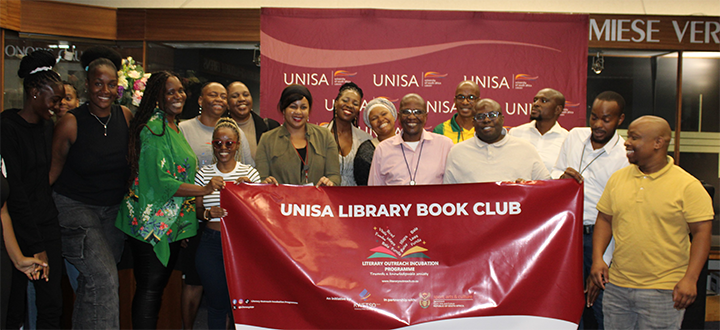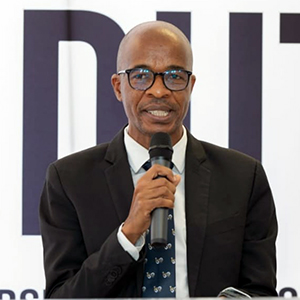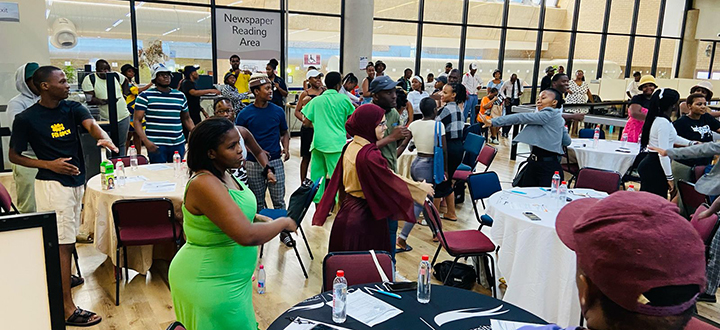
South African libraries came alive during Library Week 2025, celebrated from 17 to 23 March under the inspiring theme “Libraries for Sustainable Communities.” This year’s theme called on libraries to reflect on their role in creating spaces that empower, educate and unite communities, in that way going far beyond simply being places to borrow books.

Book Club activity
In response, Unisa Library and Information Services (LIS) spearheaded a series of activities that highlighted its ability to preserve culture, promote inclusivity and provide access to information. Through storytelling, thought-provoking dialogue and the promotion of indigenous languages, libraries demonstrated that they remain central to the building of sustainable, informed and connected communities.
A celebration of language and identity
The celebratory week began on 17 March with the launch of Unisa LIS's first-ever book club activity, a mother tongue reading session. Students and staff gathered at the library, transforming the space into a vibrant celebration of language. The sounds of isiZulu, Afrikaans, Sesotho, Setswana, Xitsonga and other indigenous languages filled the room as participants took turns reading poetry, stories and reflections in their home languages. The atmosphere was charged with emotion, as storytelling was transformed from being just a literary exercise into an act of cultural preservation.
The event embraced inclusion in its fullest sense by incorporating South African Sign Language (SASL), ensuring that all voices could be heard and understood. In his opening address, Professor Jan Maluleka of the Department of Information Science reflected on the power of language, stating, “When you speak to someone in their own language, you speak to their heart.”

Prof Ngoepe at the Durban University of Technology Library
To mark the significance of the event, Kate Lengwana, Director at Kwetso Consulting, presented a banner as part of the literary outreach and promotion programme. Accepting the banner, Executive Director of Unisa LIS, Professor Mpho Ngoepe, emphasised the importance of storytelling and indigenous knowledge systems, saying, “This banner is not just a symbol; it is a reminder of our responsibility to keep stories alive, to promote indigenous languages and to make libraries the heartbeat of our communities.”
Challenging libraries to do more
Library Week 2025 served as both a platform for critical reflection and a call to action. On 18 March, Ngoepe delivered a keynote address at the Durban University of Technology Library event, urging libraries to rethink their role in society, and raising the pertinent question: How do we sustain communities when so many are left out of our library systems?
Only seven per cent of South African schools have functional libraries, while public libraries remain scarce. Academic libraries often serve only students and faculty, leaving many without access to critical information. To remain sustainable, libraries must break barriers by digitising collections, embracing open access, preserving indigenous knowledge, and combating misinformation. As Ngoepe emphasised, “Libraries must be the custodians of truth in an age of misinformation and digital exclusion.” His message was clear: libraries must adapt, innovate, and ensure that no one is left behind in the pursuit of knowledge.
Books as pathways to connection and growth
On 19 March, Unisa LIS continued its celebration of Library Week with a book talk and the official launch of the regional book club in collaboration with the Unisa North Eastern Region. To set the tone, Freeman Zulu, Deputy Director: Unisa Regional Branch Libraries, emphasised the vital role of libraries in promoting sustainability and inclusivity, stating, "Libraries are fundamental in shaping communities and preserving knowledge." He further highlighted the importance of book clubs in fostering identity, preserving culture, and enhancing critical thinking, adding: "This LIS book club is a step toward cultivating a culture of reading and writing, especially in indigenous languages, ensuring the preservation of knowledge for future generations."
Ngoepe, who facilitated the session in Northern Sotho, expressed the view that writing books plays a crucial role in shaping our identity, preserving our culture, and fostering critical thinking. The regional book club, launched during the event, was created to ensure that these important conversations continue well beyond Library Week. Its goal is to cultivate a culture of reading and storytelling that extends beyond the university and into surrounding communities, reinforcing the idea that libraries are not just for scholars, but for everyone.
Delivering the keynote address, author Maphehle Nkogatse emphasised the transformative power of language, stating, “Language is a powerful tool for establishing empathy among individuals and fostering cohesiveness.” His words underscored the importance of storytelling in connecting people, preserving heritage, and strengthening social bonds.
Libraries as spaces for holistic wellbeing
As the week ended, the focus shifted to the broader role that libraries play in supporting the wellbeing of students and the community. On 20 March, Unisa Durban LIS, in partnership with the Office of the Dean of Students, hosted a health and wellness programme. The event demonstrated that libraries are not only instrumental in the achievement of academic success, but also have a role to play in supporting people in every aspect of life.

Unisa Durban Library Week celebration
Students engaged in discussions about financial literacy, gaining practical knowledge about managing budgets and student expenses. Sessions on gender-based violence awareness created a safe space for dialogue on pressing social issues, while mental health discussions provided tools to cope with academic and personal pressures. The programme underscored the fact that libraries are more than information hubs; they are spaces where people can seek guidance, find support and access resources that help them navigate life’s challenges.
Sustaining the impact of library week
With Library Week 2025 having drawn to a close, the question to consider is not whether libraries are valuable, but how they can sustain and expand their impact beyond a single week of celebration. Will libraries continue to drive sustainable communities, or will they remain confined to their traditional roles? The answer lies in the actions taken in the weeks, months and years to come.
*By Itumeleng Mpete, Marketing Coordinator, Library and Information Services, with input from ChatGPT
0 Comments.